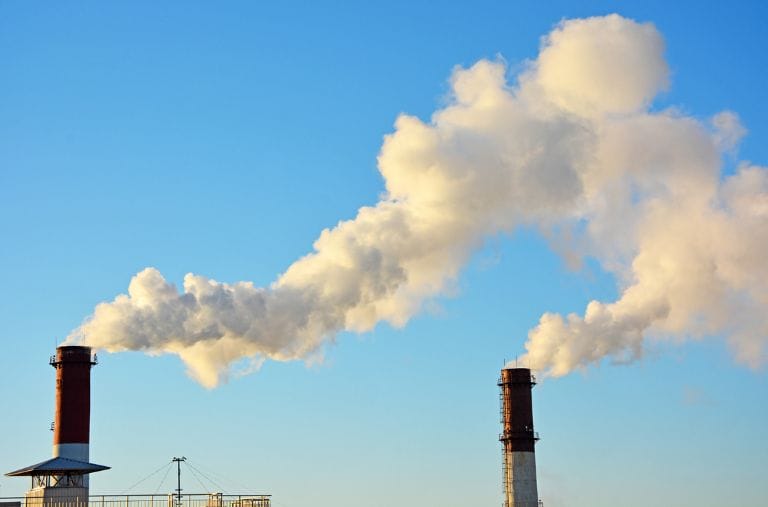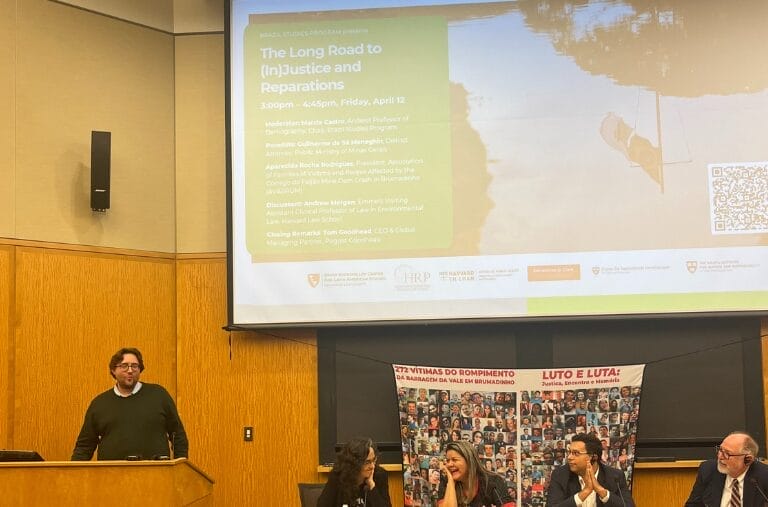Although climate litigation has been on the agenda of some activists for many years, the importance of climate litigation is only set to increase as the urgency of the climate crisis and the failures of politicians becomes increasingly apparent.
Whilst public focus around this type of litigation often centres on cases brought against states for their inaction, there is also a steadily growing pool of corporates being held to account across Europe for their undeniable role in accelerating climate destruction. With EU legislation looming on the horizon, is this finally the beginning of the end for corporate climate impunity, or is this yet another distraction from meaningful change?
This article explores some of the ground-breaking developments in this space, including the Royal Dutch Shell judgment in the Netherlands and the TotalEnergies case in France, as well as the potential impact of the EU’s Proposal for a Directive on Corporate Sustainability Due Diligence.
European Corporates in the Courts
Outside of the US, over 70% of climate cases focus on holding governments to account for their failure to adequately address the climate crisis.[1] For example, the Netherlands has seen progressive movement in this space with the 2019 Urgenda decision.[2] Here, the Supreme Court of the Netherlands upheld judgments of the lower courts and ordered the Dutch Government to cut its greenhouse gas emissions by at least 25% by the end of 2020 (compared to 1990 levels).
However, in recognition of the ever-increasing influence that big corporates hold in the political and social sphere, the spotlight has begun to shift to the role that non-state entities play in creating and addressing the climate crisis.[3]
Shell – The Netherlands
In arguably the most ground-breaking corporate climate decision of the decade, in May 2021, the District Court of the Hague ordered Royal Dutch Shell to significantly reduce its greenhouse gas emissions.[4] The Court found that the fossil-fuel giant was under an obligation to reduce its emissions by 45% by 2030 from its internal operations (as an obligation of result), as well as from its business partners and even end-users (as an obligation of significant best-efforts). Whilst not finding that the fossil-fuel company had breached these obligations yet, the Court believed its current transition plan meant it was on course to do so.
Founding its judgment on the Dutch general tort provision[5], the Court held that Royal Dutch Shell was acting in conflict with unwritten law, namely a duty of care owed to Dutch residents (particularly in the Wadden Sea area) to reduce its emissions and prevent climate change. In construing this standard of care, the Court drew on human rights obligations such as the right to life and the right to respect for private and family life, as well as the UN Guiding Principles on Business and Human Rights. However, the lasting impact that this decision will have on the climate litigation movement will, of course, depend on the outcome of Shell’s appeal, which is currently pending before the Court of Appeal in the Hague.[6]
TotalEnergies – France
Since the Shell case was filed in the Netherlands and began progressing through the Dutch courts, we have seen more and more cases in European courts mirroring this approach and seeking to hold energy giants to account for climate damage. As a key example, a case has been filed in France against TotalEnergies. In January 2020, a group of claimants (including at least sixteen local authorities[7] and six NGOs[8]) filed a claim against the major French oil and gas producer (responsible for 1% of greenhouse gas emissions globally[9]) demanding that they implement a concrete plan to significantly reduce their greenhouse gas emissions.[10] After successfully arguing (on appeal) that the civil, as opposed to commercial, courts have jurisdiction to hear this case, the case is now pending before the Paris Judicial Court. Further, in February 2023, the claimants requested the imposition of provisional measures obliging TotalEnergies to cease all new oil and gas projects whilst a merits decision is awaited.[11]
Although this case is just one of many cases pending against TotalEnergies, it is the only one focusing on emissions reductions directly. The claimants primarily claim that TotalEnergies has breached its obligations under France’s Duty of Vigilance Law of March 27, 2017.[12] Under this law, TotalEnergies is obliged to create a plan to prevent and address human rights and environmental violations within its business, but is accused of failing to do so in respect of climate impacts. Whilst under other regimes, this type of corporate due diligence obligation constitutes only soft law (for example, the UN Guiding Principles on Business and Human Rights), the French Duty of Vigilance Law imposes a pioneering hard law obligation. This case will explore the scope and efficiency of using due diligence obligations to hold corporates to account in addressing climate change.
Should the Duty of Vigilance Law obligations be found to lack teeth, TotalEnergies is also accused of failing in its obligation to preserve the environment under the French Environmental Charter, and to prevent harm and make reparations under the French Civil Code.
Given the imminent imposition of somewhat similar legislation within Europe, many eyes will be eagerly looking to the French courts to see how a corporate due diligence provision focusing on addressing human rights and environmental abuses might operate at a national level.
PGE GiEK – Poland
Similarly to the Shell and TotalEnergies cases, Greenpeace is taking Poland’s biggest CO2 emitter – PGE GiEK (a subsidiary of state-owned utility company PGE Polska Grupa Energetyczna) – to court in Poland.[13] Greenpeace demands the ceasing of all coal and lignite investments by PGE GiEK and a concrete commitment to reduce their emissions to zero by 2030.[14] Crucially, PGE GiEK owns Belchatów power plant, which is the EU’s largest coal-fired power plant, and the biggest single-entity greenhouse gas emitter in Europe (releasing more emissions than many European states in 2019).[15]
In contrast with the corporate due diligence nature of the French Dutch of Vigilance Law, Greenpeace Poland relies upon a specific provision of the Polish Environmental Law (enacted in April 2001), which relates directly to the active protection of the environment.[16] Article 323 of the Polish Environmental Protection Law creates a distinct right of an environmental organisation to demand that a perpetrator of unlawful environmental harm restores the environment to its original state (restitution), and takes future preventative measures.
In August 2022, PGE GiEK confirmed that it would not produce a decarbonisation strategy in response to a question from the court, arguing that a new governmental agency was already being created to supposedly phase out coal. Greenpeace vehemently disagreed that this governmental agency would in any way lead to a true transition away from coal and so decided to continue with the claim nonetheless.[17] The case is now pending before the Polish courts.
Car Manufacturers – Germany
Climate action is not solely directed at large energy companies but is increasingly extending to many other sectors. One such example is the claims filed in 2021 in the German courts by various directors of environmental organisations (and one German farmer) against three major car manufacturers – Volkswagen,[18] BMW and Daimler (Mercedes Benz).[19]
In all cases, it was argued that the companies must put in concrete plans to cease the sale of cars powered by fossil fuels (petrol and diesel) by 2030.[20] Furthermore, the Volkswagen claimants demanded that the car manufacturers reduce their overall emissions by up to 65% on the basis that the defendant’s greenhouse gas emissions violated their duty of care to the claimants by significantly contributing to climate change and thus violating the claimants’ protected rights to inter alia health and property.[21] When demanding a 65% emission reduction, the claimants looked to a 2021 landmark judgment of the German Constitutional Court which held that the climate targets under the government’s Climate Change Act placed disproportionate burdens on future generations to remedy the climate crisis and thus would violate their fundamental rights.[22] As a result, in August 2022, the German government introduced the amended German Climate Change Act, which enhanced emission reduction targets to 65% by 2030 (an increase from 55%) and full neutrality by 2045.[23]
Recent months have seen all these innovative cases being rejected in the first instance – with at least part of their reasoning pointing towards the need for legislative action to reduce carbon emissions. [24] Whilst all hope is not lost as the claimants will be appealing these decisions, these cases make clear that there still exist significant hurdles in bringing climate cases against corporates, especially when outside of the fossil-fuel sector.
The EU moves towards climate accountability
As climate change activism is moving through the courts, steps are also being taken at a European legislative level to augment corporate climate accountability. On 23 February 2022, the European Commission adopted its long-awaited Proposal for a Directive on Corporate Sustainability Due Diligence (the “EU Proposal”), focusing on the protection of human rights and the environment.[25]
The EU Proposal is due to be negotiated by the European Parliament and the Council of the European Union (the “EU Council”) in early 2023. On 1 December 2022, the EU Council published its “General Approach”.[26] The General Approach contains an amended version of the EU Proposal which represents the EU Council’s official political position on the proposed directive. It will form the basis of its negotiations with the European Parliament.[27] Whilst one committee of the European Parliament also published a draft report on the EU Proposal on 7 November 2022, it still requires further input from various parliamentary committees before concluding its official negotiation position.[28] Nonetheless, as both these documents are still subject to debate and negotiation before an official combined position is taken, this article primarily analyses the official EU Proposal published on 23 February 2022.
Due diligence obligations
Under the EU Proposal, certain companies must identify, prevent, mitigate, bring to an end or minimise actual and potential adverse human rights and environmental impacts (“Adverse Impacts”) which arise from their operations (Articles 6-8 EU Proposal), similar in some ways to the French Duty of Vigilance Law. Likewise, these companies must set out their environmental and human rights due diligence processes in their company policies and codes of conduct (Article 5 EU Proposal).
The Adverse Impacts under the EU Proposal include the violation of the provisions of international conventions listed in the EU Proposal’s Annex (Article 3(b) and 3(c)). Crucially, the Annex contains a worryingly limited list of environmental norms and conventions, with no explicit mention of climate change and excluding key agreements such as the Paris Agreement.[29] The Council’s General Approach also fails to address this notable absence.[30]
Furthermore, only companies within certain high employee and revenue thresholds are caught by these due diligence obligations, albeit with lowered thresholds for certain “high-risk” sectors (Article 2(1)(b)). This is a key differentiator between the EU Proposal and its soft-law predecessors – the United Nation’s Guiding Principles on Business and Human Rights (“UNGP”)[31] and the OECD Guidelines for Multinational Enterprises (“OECD Guidelines”).[32] Whilst the UNGP and OECD Guidelines apply broadly to all businesses irrespective of size,[33] the EU Proposal’s more limited scope may stifle the progressive approach of some national lawmakers and judiciaries. For example, in the Netherlands breakthrough cases such as the one against Shell have already been heard, and new, broader, corporate due diligence legislation is on the horizon.[34] However, in numerous other Member States, the EU Proposal will undoubtedly be an advancement, introducing far more expansive corporate due diligence requirements than ever seen before.
Climate change provisions
Despite the importance of the issue in global discourse, there is just one article which directly addresses the issue of global warming in the EU Proposal – Article 15. This provision (which is distinct from the main due diligence provisions) imposes an obligation on a limited category of the very largest companies to adopt a plan to align business models and strategy with the transition to a sustainable economy and the limiting of global warming to 1.5 °C this century as required under the Paris Agreement (the “Transition Plan”). Where climate risks are a principal risk for these large businesses, emission reduction targets must also be set. As a small addition, Article 25 of the EU Proposal does require directors to consider the climate change consequences of their decisions as part of their duty of care. However, this point was controversially reversed under the General Approach due to concerns about overreach into national competencies.[35]
Given the limited number of environmental treaties listed in the Annex to the EU Proposal (discussed above), this provision – applicable to only a small number of companies– is a disappointing outcome for many climate activists.[36] Even for companies caught by this provision, no specific requirements are set out as to what this Transition Plan must include nor its implementation requirements.[37] The Council’s General Approach equally missed an opportunity to strengthen this provision, despite calls from civil society to do so.[38]
Civil Liability
In a welcome move, Article 22 of the EU Proposal requires Member States to put in place a regime to establish the civil liability of companies who fail to comply with the EU Proposal and consequently cause damage (Article 7-8 EU Proposal). In such scenarios, businesses would have an obligation to compensate individuals, albeit that the General Approach made a notable caveat that this should not lead to overcompensation. The Council’s General Approach also proposed a requirement of fault – requiring either negligence or intention. Whilst the General Approach’s additions would provide some welcome clarity on liability requirements (if accepted by the Parliament), they also highlight that civil liability for environmental harms will not be easy to establish.[39]
It is important to note that civil liability under Article 22 does not extend to the (minimal) climate change obligations imposed on the largest companies under Article 15. Relating only to obligations under Articles 7 and 8, this civil liability provision is therefore seen by some as ineffective from a climate perspective, given the lack of reference to climate change in the Article 7-8 obligations themselves (and the Annex).[40]
One further area for improvement in Article 22 is the burden of proof – a notoriously high barrier to justice in most cases relating to environmental harms where much of the information is in the defendants’ hands but remains for the claimants to prove.[41] For example, the proposed legislation on corporate due diligence in the Netherlands proposes to reverse the burden of proof. Here, if the claimant can evidence a suspicion of a link between the defendant’s activities and the Adverse Impact, it is for the defendant to prove that they did, in fact, comply with their obligations. The proposed Dutch legislation was further discussed by Pogust Goodhead’s Amsterdam team in their recent article.
Clearly, whilst the potential power of this civil liability provision remains an exciting prospect, more work must be done to strengthen the climate and environmental protection it provides.
Conclusion: Is this the end of corporate impunity for climate change?
Whether it is due to legislative failures to adequately address the climate crisis, or the realisation that corporates hold just as much power as many states, there is a distinct movement across Europe towards robust corporate liability in the context of climate change. Despite the challenges in finding sufficient legal footing for many of these important corporate cases, claimants are resorting to a varied assortment of innovative legal tools to found their claims. Some progressive judiciaries such as the courts of the Netherlands in Shell and legislatures such as the French with their Duty of Vigilance Law are steadily creating avenues for enforcement of environmental and human rights claims against corporates. However, clearer paths towards accountability are needed in many states.
The EU Proposal would undoubtedly go a long way to fill this void; providing a substantially clearer basis for bringing cases against European corporates for many environmental and human rights harms. However, given the particular challenges that climate change litigation poses, this EU Proposal requires continued scrutiny and amendment so that it can truly establish a gateway to hold corporates to account for their contributions to the climate crisis. With a long journey ahead of it before being formally adopted (and even longer before it is implemented), only time will tell whether or not the EU Proposal will fulfil its full potential of becoming a vital weapon in the fight against climate change.
[1] Setzer & Higham, Global Trends in Climate Change Litigation: 2022 Snapshot (June 2022) <https://www.cccep.ac.uk/publication/global-trends-in-climate-change-litigation-2022/>.
[2] Supreme Court of the Netherlands 20 December 2019, ECLI:NL:HR:2019:2007.
[3] Setzer & Higham (n 1).
[4] District Court of the Hague, ECLI:NL:RBDHA:2021:5339 (26 May 2021) <https://uitspraken.rechtspraak.nl/inziendocument?id=ECLI:NL:RBDHA:2021:5339>
[5] Book 6 Section 162 Dutch Civil Code.
[6] Royal Dutch Shell, ‘Frequently Asked Questions on Dutch District Court Legal Case’ (22 March 2022) <https://www.shell.com/media/news-and-media-releases/2021/shell-confirms-decision-to-appeal-court-ruling-in-netherlands-climate-case/_jcr_content/par/grid_copy_copy_copy_/p0/textimage.stream/1647925854400/460167304a697f411be1b9f80c6e05be0ac057fb/dutch-district-legal-case-faq.pdf>; Clearly Gottleib, ‘Dutch Court Orders Shell to Reduce Emissions in First Climate Change Ruling Against Company’ (30 June 2021), <https://www.clearygottlieb.com/news-and-insights/publication-listing/dutch-court-orders-shell-to-reduce-emissions-in-first-climate-change-ruling-against-company>.
[7] Authorities include Arcueil, Bayonne, Bègles, Bize-Minervois, Région Centre-Val de Loire, Correns, Est Ensemble, Grenoble, La Possession, Mouans-Sartoux, Nanterre, Paris, Poitiers, Sevran and Vitry-Le-François, as well as the recent interesting addition of the City of New York (United States).
[8] NGOs include Notre Affaire À Tous, Sherpa, Les Eco-Maires, France Nature Environnement, ZEA and, as an accessory voluntary intervention: Amnesty International France. See here : <https://notreaffaireatous.org/wp-content/uploads/2022/09/Total-case-press-release.docx-1.pdf>.
[9] Sherpa, ‘First climate change litigation again TOTAL in France: 14 local authorities and 5 NGOs take Total to court’ (28 January 2020) <https://www.asso-sherpa.org/first-climate-change-litigation-against-total-in-france-14-local-authorities-and-5-ngos-take-total-to-court>.
[10] Sherpa, ‘First climate change litigation again TOTAL in France: 14 local authorities and 5 NGOs take Total to court’ (n 9).
[11] Sherpa, ‘Climate litigation against Total: the Versailles Court of Appeal confirms the jurisdiction of the judicial court’ (18 November 2021) <https://www.asso-sherpa.org/climate-litigation-against-total-the-versailles-court-of-appeal-confirms-the-jurisdiction-of-the-judicial-court>; This has now also been provided for in law under Article L. 211-21 of the French Code of Judicial Organisation; Sherpa, ‘Climate change litigation against Total: NGOs and local authorities’ request for provisional measures pending trial’ <https://www.asso-sherpa.org/climate-change-litigation-against-total-ngos-and-local-authorities-request-for-provisional-measures>.
[12] Unofficial translation of the original complaint can be found here: http://climatecasechart.com/non-us-case/notre-affaire-a-tous-and-others-v-total/; Loi 2017-399 du 27 mars 2017 relative au devoir de vigilance des sociétés mères et des entreprises donneuses d’ordre, Journal Officiel de la République Française n°0074 du 28 mars 2017 <https://www.legifrance.gouv.fr/jorf/id/JORFTEXT000034290626>.
[13] Regional Court of Łódź, Greenpeace Poland v. PGE GiEK, (filed on 11 March 2020).
[14] Greenpeace Poland, ‘In May 2022 the biggest climate justice litigation case in the history of Poland had its first court hearing’ <https://dzialaj.greenpeace.pl/greenpeace-poland-climate-lawsuite>.
[15] Greenpeace Poland, ‘In May 2022 the biggest climate justice litigation case in the history of Poland had its first court hearing’ (n 14); Client Earth, ‘Huge coal win as judge orders Europe’s largest power plant to work with ClientEarth to close’ (22 September 2020) <https://www.clientearth.org/latest/latest-updates/news/huge-coal-win-as-judge-orders-europe-s-largest-power-plant-to-work-with-clientearth-to-close/>
[16] The Act of 27 April 2001 on Environmental Law, the consolidated text of 2017, Official Journal of the Laws, Item 519, as amended.
[17] Greenpeace Poland, ‘In May 2022 the biggest climate justice litigation case in the history of Poland had its first court hearing’ (n 14).
[18] Greenpeace, ‘Greenpeace files suit against Volkswagen’ (9 September 2021) <https://www.greenpeace.de/publikationen/greenpeace-files-suit-against-volkswagen>.
[19] Reuters, ‘Explainer: Why are BMW and Daimler being sued over climate change?’ (21 September 2021) <https://www.reuters.com/business/autos-transportation/why-are-bmw-daimler-being-sued-over-climate-change-2021-09-21/>
[20] Greenpeace, ‘Greenpeace files suit against Volkswagen’ (n 18); Reuters, ‘Explainer: Why are BMW and Daimler being sued over climate change?’ (n 19).
[21] Official English translation of the summary of the motion by Greenpeace found here: <https://www.greenpeace.de/publikationen/greenpeace_vs_vw_english.pdf>; Greenpeace, ‘Greenpeace files suit against Volkswagen’ (n 18); Greenpeace, ‘Greenpeace sues Volkswagen for fuelling the climate crisis and violating future freedom and property rights’ (9 November 2021) <https://www.greenpeace.org/international/press-release/50625/greenpeace-sues-volkswagen-for-fuelling-the-climate-crisis-and-violating-future-freedom-and-property-rights/>;.
[22] Bundesverfassungsgericht, ‘Constitutional complaints against the Federal Climate Change Act partially successful’ (29 April 2021) < https://www.bundesverfassungsgericht.de/SharedDocs/Pressemitteilungen/EN/2021/bvg21-031.html>.
[23] Library of Congress, ‘Germany: Amendment of Climate Change Act Codifies Climate Neutrality Goal by 2045’ (31 August 2021) < https://www.loc.gov/item/global-legal-monitor/2021-09-28/germany-amendment-of-climate-change-act-codifies-climate-neutrality-goal-by-2045/#:~:text=(KSG%20%C2%A7%203%2C%20para.,emissions%20reduction%20target%20of%2088%25.>.
[24] The Independent, ‘German court rejects climate lawsuit against automaker BMW’ (7 Feb 2023) <https://www.independent.co.uk/news/ap-munich-paris-finland-portugal-b2277434.html>; Reuters, ‘Mercedes-Benz climate case dropped by German court, appeal planned’ (13 September 2022) <https://www.reuters.com/business/autos-transportation/german-district-court-drops-climate-change-case-against-mercedes-benz-2022-09-13/>; Reuters, ‘Court dismisses Greenpeace-led climate case against Volkswagen, plaintiffs to appeal’ (14 February 2023) <https://www.reuters.com/business/autos-transportation/court-dismisses-greenpeace-led-climate-case-against-volkswagen-plaintiffs-appeal-2023-02-14/>.
[25] Proposal for a Directive of the European Parliament and of the Council on Corporate Sustainability Due Diligence and amending Directive (EU) 2019/1937 (23 February 2022) 2022/0051(COD); see also <https://ec.europa.eu/info/business-economy-euro/doing-business-eu/corporate-sustainability-due-diligence_en>.
[26] Council of the European Union, ‘General Approach’ (1 December 2022) <https://data.consilium.europa.eu/doc/document/ST-15024-2022-REV-1/en/pdf>.
[27] Council of the EU, ‘Council adopts position on due diligence rules for large companies’ (1 December 2022) <https://www.consilium.europa.eu/en/press/press-releases/2022/12/01/council-adopts-position-on-due-diligence-rules-for-large-companies/>. See here for more detail on the Council’s decision-making process: <https://www.consilium.europa.eu/en/council-eu/decision-making/>.
[28] European Parliament, ‘Draft Report’ < https://www.europarl.europa.eu/doceo/document/JURI-PR-738450_EN.pdf> (7 November 2022); Mayer Brown, ‘Human Rights and the Environment – European Parliament committees reach agreed positions on draft Corporate Sustainability Due Diligence Directive’ (27 January 2023) <https://www.eyeonesg.com/2023/01/human-rights-and-the-environment-european-parliament-committees-reach-agreed-positions-on-draft-corporate-sustainability-due-diligence-directive/>.
[29] ECCJ, ‘European Commission’s proposal for a directive on Corporate Sustainability Due Diligence: A comprehensive analysis’ (April 2022) <https://corporatejustice.org/wp-content/uploads/2022/04/ECCJ-analysis-CSDDD-proposal-2022.pdf>, page 9: “Key environmental conventions are missing, including the Paris Agreement, the Ramsar Convention on Wetlands of International Importance Especially as Waterfowl Habitat, the International Convention for the Prevention of Pollution from Ships, the UN Convention on the Law of the Sea, the UN Convention to Combat Desertification or the UNECE Convention on Access to Information, Public Participation in Decisionmaking and Access to Justice in Environmental Matters (Aarhus Convention).”
[30] The Annex has notable absences on human rights provisions as well (e.g. the European Convention on Human Rights, the European Social Charter and the European Charter of Fundamental Rights).[30] Human rights and environmental protection are intrinsically linked as many of the individuals worst affected by climate change suffer abuses of their human rights, e.g. a violation of the right to respect for private and family life, or the prohibition of inhumane and degrading treatment. What is more, many environmental defenders have their human rights violated as they fight to protect the planet e.g. the right to fair trial or freedom of expression. For more see, Claire Methven O’Brien and Jacques Hartmann (EJIL:Talk!), ‘The European Commission’s proposal for a directive on corporate sustainability due diligence: two paradoxes’ (19 May 2022) < https://www.ejiltalk.org/the-european-commissions-proposal-for-a-directive-on-corporate-sustainability-due-diligence-two-paradoxes/>; Office of the High Commissioner for Human Rights (OHCHR), OHCHR Feedback on the Proposal for a Directive of the European Parliament and of the Council on Corporate Sustainability Due Diligence (23 May 2022) < https://www.ohchr.org/sites/default/files/2022-05/eu-csddd-feedback-ohchr_0.pdf>, page 3.
[31] Office of the High Commissioner for Human Rights, Guiding Principles on Business and Human Rights, Section II (2011) <https://www.ohchr.org/sites/default/files/documents/publications/guidingprinciplesbusinesshr_en.pdf>.
[32] OECD, OECD Guidelines for Multinational Enterprises (2011) <https://www.oecd.org/daf/inv/mne/48004323.pdf>.
[33] OECD Guidelines, paragraph 4, page 17; UNGP, Principle 14, page 15.
[34] Professor Enneking interview in Mr.Online, ‘DOOR RECHTSZAKEN WORDEN BEDRIJVEN EN JURISTEN WAKKER’<https://www.mr-online.nl/door-rechtszaken-worden-bedrijven-en-juristen-wakker/>.
[35] Section III(F), paragraphs 30-32, General Approach (n 26).
[36] ECCJ, ‘European Commission’s proposal for a directive on Corporate Sustainability Due Diligence A comprehensive analysis’ (n 29), page 4.
[37] ECCJ, ‘European Commission’s proposal for a directive on Corporate Sustainability Due Diligence A comprehensive analysis’ (n 29), page 17.
[38] ECCJ, ‘European Commission’s proposal for a directive on Corporate Sustainability Due Diligence A comprehensive analysis’ (n 29), page 17.
[39] General Approach, Article 22(1)(a).
[40] ECCJ, ‘European Commission’s proposal for a directive on Corporate Sustainability Due Diligence A comprehensive analysis’ (n 29), page 20-22.
[41] ECCJ, ‘European Commission’s proposal for a directive on Corporate Sustainability Due Diligence A comprehensive analysis’ (n 29), page 20-22.










